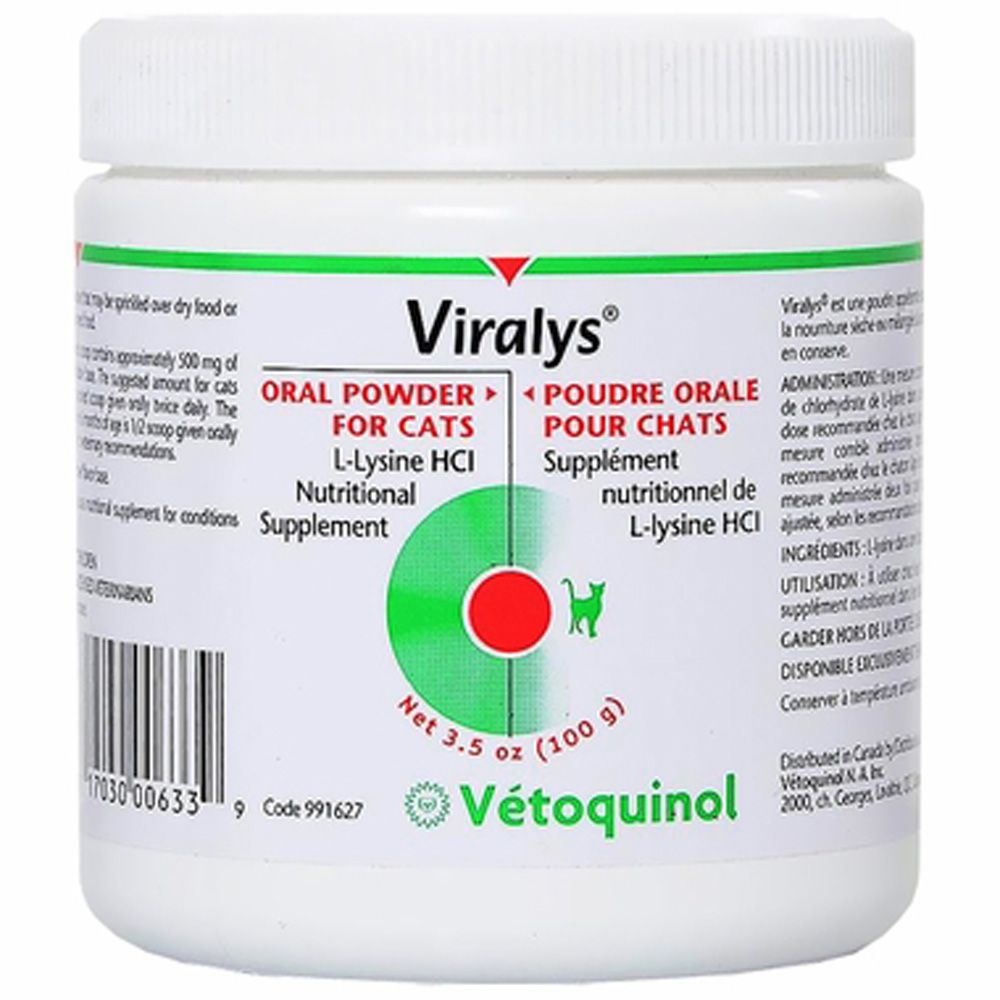Sitewide SALE! GET 15% Off! Use Code EPX15 *

Vetoquinol Viralys (L-Lysine for Cats) Powder (100 grams)
- Description
- Directions
- Reviews
Description
Viralys L-Lysine for Cats (100 grams)
If your cat is suffering from feline herpes virus, then Viralys with L-Lysine can help. Viralys by Vetoquinol is a specially formulated powder that is effective in herpes virus treatment.
Viralys provides quick relief for common vius symptoms, both respiratory and eye symptoms. If your cat has breathing problems, or has leakage of the eye or nose due to the herpes virus, Viralys can quickly clear those symptoms up.
This dietary supplement is supplemented with l-lysine to quickly relieve your pet's symptoms. This powder is also quick and easy to administer-- all you have to do is mix it in with your cat's food. Viralys is specially formatted so that it is appealing to cats so that feeding them is easy.
The 100 gram container is perfect for any cat who suffers from chronic herpes symptoms, containing multiple doses so that you can provide you can with quick and easy relief, and improve their overall quality of life.
Directions
Feline Herpes Virus
What is feline herpes
virus?
Feline herpes virus is an upper respiratory virus of cats. It is also known as
rhinotracheitis virus. It is very common among cats, especially in environments
where there are multiple cats or new cats are constantly interacting. The virus
is spread through the air and replicates in the upper respiratory tract (nasal
area, tonsils). The conjunctiva of the eye is also affected during the primary
infection which results in
conjunctivitis. Clinical signs of infection include sneezing and ocular and
nasal discharge. In most cases the primary infection resolves with no residual
ocular lesions. However, depending on the age when the cat is affected, the
serotype of the virus (infectivity or strength of infection), and other factors,
there may be various ocular signs. In very young cats, adhesions of the eyelids
to each other or to the cornea may occur. Adult cats may experience recurrent
conjunctivitis or corneal ulcers. The virus remains latent in the nerves that
serve the eyes. When a cat is stressed or exposed to new serotypes (different
strains) of herpes virus, the ocular disease can recur. There is some evidence
that eosinophilic keratitis, plasmacytic-lymphocytic keratitis, corneal
sequestrum, and some cases of anterior uveitis may be associated with feline
herpes virus infection.
How do cats get feline herpes virus?
Most cats are affected as kittens, contracting the infection from their mothers.
Stray cats, multi-cat households, and cats from households where new cats are
constantly introduced are more likely to suffer infection. Feline herpes virus
is not contagious to dogs or to humans but only affects cats.
How is feline herpes virus diagnosed?
History and clinical signs can diagnose ocular diseases caused by feline herpes
virus. Aside from history and clinical signs, diagnostic tests for feline herpes
virus include virus isolation, immunofluorescent antibody testing, polymerase
chain reaction testing, serology, and cytology. Testing can be expensive and is
generally reserved for specific cases. Tests that may not specifically detect
the presence of herpes may be used to detect ocular disease caused by herpes.
These tests include a Schirmer tear test (measuring tear production), corneal
staining, and conjunctival biopsy.
How is feline herpes virus treated?
Treatment for feline herpes virus infections is nonspecific and generally
directed at controlling secondary bacterial infection. A topical antibiotic such
as tetracycline or erythromycin may be prescribed for use in the eye. Systemic
antibiotics may also be prescribed. Oral L-Lysine is recommended by many
veterinary ophthalmologists at a dose of 250-500 mg twice daily. Lysine competes
with another amino acid, arginine, that herpes virus must have in order to
reproduce. Lysine has been demonstrated to decrease the severity of ocular
symptoms associated with herpes virus infection (1) and reduce viral shedding
during periods of disease recurrence (2). Depending on symptoms, other
medications such as topical antiviral drugs, topical polysulfated
glycosaminoglycans, topical nonsteroidal anti-inflammatory drugs or topical
interferon may be used. In some cases the ocular diseases resulting from feline
herpes virus may require surgical intervention. The key to managing the clinical
signs associated with feline herpes virus is controlling the cat's environment.
Cats exposed to multiple cats (indoor-outdoor cats), cats in multiple cat
households, or cats that are frequently introduced to new cats are difficult to
keep disease free. Reducing stress by maintaining a stable routine is helpful in
preventing recurrences of disease. Keep in mind that it is the nature of the
virus to see recurrences of the disease and periodic treatment is often
necessary.
Administration: One rounded scoop contains approximately 500 mg of L-lysine Hydrochloride in a palatabe base. The suggested amount for cats over 6 months of age is one rounded scoop given orally twice daily. The suggested amount for kittens under 6 months of age is 1/2 scoop given orally twice daily. Adjust amount based on veterinary recommendations.
Use: For use in cats & kittens as a nutritional supplement for conditions responsive to Lysine.
KEEP OUT OF THE REACH OF CHILDREN
Reviews
- best supply and price on the net


